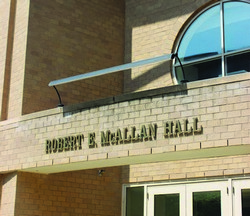Monmouth University’s Masters of Social Work program (MSW) has been ranked in the top 100 nationwide among 253 institutions based on a recent “2020 Best Graduate Schools” rankings from U.S. News & World Report.
The program was ranked 59th in the health schools’ specialties category and second in the state of New Jersey based off eight institutions who offer the program.
It prepares students for advanced practice in clinical social work and in global and community practice.
Robin Mama, Ph.D., Dean of the School of Social Work, explained that when she joined the Monmouth faculty in 1992, social work was combined into a department along with anthropology, sociology, criminal justice, and Africana studies.
The department, however, only had two faculty members including Mama herself, and 65 social work students.
Mama said, “Over the course of a few years, we had many inquiries from alumni and other people from the community as to when we might start an MSW program.”
The former Chair of the Department, Mark Rodgers, Ph.D., worked with Mama on their first proposal for this program in 1996.
Rodgers and Mama started the program in 1998 with the addition of 4 faculty and a Field Director, and 30 students.
“We added another 60 students in the second year of the program and have just been going from there,” Mama added.
Carolyn Bradley, Ph.D., Director of the MSW Program, believes this program distinguishes from other institutions because the focus on social justice and human rights serves as the foundational perspective of the curriculum. She also believes since the program is small, it allows students easy access to faculty who provide mentorship.
“Our faculty genuinely wishes to get to know our students and to work closely with them on research and to assist them in the selection of their practice area. We use a cohort model admitting students in groups of 30. This model allows students to develop collegial relationships with other members of their class, which helps provide support through the program and after graduation,” said Bradley.
The MSW program admits between 90 and 120 graduate students each year. Students have the opportunity to choose from two concentrations: clinical practice with families and children or global and community practice.
Bradley described that graduates of the MSW program work in a variety of practice areas from behavioral health settings, hospitals, schools, correctional facilities, program administration, public policy development, community organizing and in international social work with the United Nations (UN), Red Cross and other development agencies. “Many of our graduates obtain jobs upon graduation with the agencies in which they did their second-year field internship,” she said.
Bradley is confident that the program will continue to evolve based on the needs of the people served by the profession and changes in thinking regarding best practice models.
Sanjana Ragudaran, Ph.D., assistant professor of social work, feels that the shifting focus from micro level social work to global community practice and policy research reflects a changing need within the profession.
“There is a need for social workers to be engaged in communities and at the policy level as we provide a unique insight to social problems. We understand that many problems our individual clients encounter stem from systemic barriers, policies and or procedures,” she said.
Working in macro settings, social workers are enablers, advocating for and with clients to eliminate these barriers through human rights and social justice lens. “There is an urgent need for social workers to work with political leaders who create and pass legislation, policies, and assign funding,” Ragudaran continued.
With the graduate program providing a diversified curriculum for social work students, there are more opportunities to build a unique skill set to use in the field. “I am glad that the MSW program at Monmouth is being recognized and ranked among the top programs in the country,” said Alexia Raess, a junior social work student on track to complete an MSW as an advanced standing student.
Raess said that she is eager to acquire more clinically based skills and experiences. “My BSW. internships and volunteer opportunities thus far have been in schools at the micro and mezzo levels, whereas my MSW internship will provide me with skills related to more micro social work practice,” she said.
“From taking classes at the BSW. level, I have been provided with texts and research regarding professionals currently in the field,” she continued.
Raess said that she is also excited to increase her field experience working directly with clients in a more individualized setting to further refine skills that she already possesses, as well as to work on acquiring a new clinical skillset.
“The ability to also have advanced standing and complete my MSW in one year at the same institution was another driving force for me in choosing to attend Monmouth,” she explained.
“Monmouth’s MSW program also appealed to me since the learning goes beyond just classroom material. The graduate program will allow me to gain field experience that will serve as a stepping-stone to my career,” Raess concluded.
PHOTO TAKEN by Nicole Riddle



